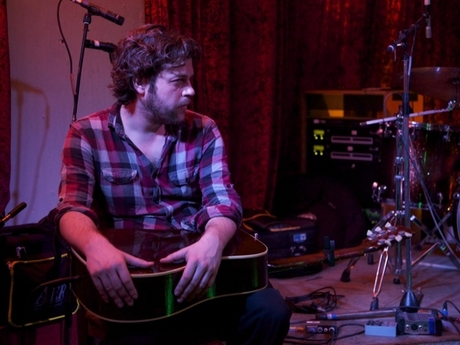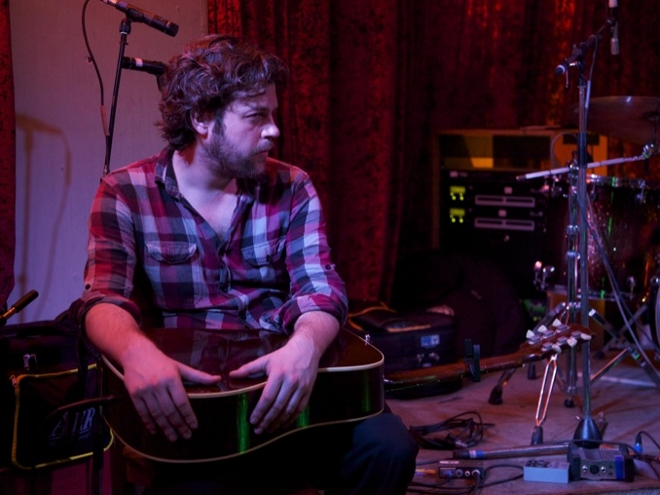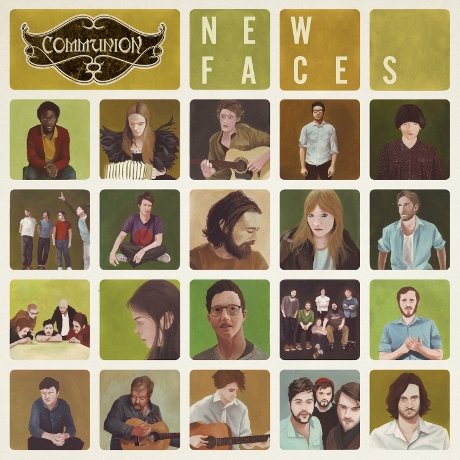Record Store Day 2012: 9 tips on running an indie label
Communion (Mumford And Sons, Ben Howard) founder Kev Jones shares his experiences


Record Store Day 2012, the biggest yet, is so close we can smell the vinyl. With that in mind, we thought we'd cash-in by talking to Kev Jones, founder of the Mumford And Sons-affiliated label Communion, stealing his ideas and making millions of money pounds. Sadly, it turns out that's not really how it works…
Communion - a potted history
Kev Jones is a musician that used to play bass in a London folk group called Cherbourg. In 2008 he set up an independent record label, called Communion alongside his friends Ben Lovett (keyboardist in Mumford And Sons) and Ian Grimble (producer/engineer to The Manics, The Fall and Travis).
Borne out of a series of club nights of the same name, and which are still very much integral to the organisation, Communion has become one of the great indie label success stories of the last decade.
Four years down the line, the label has not only survived, but seen releases from the likes of Ben Howard, Michael Kiwanuka and Daughter, as well as a number of landmark compilations, featuring all of those mentioned above, plus Laura Marling, Jay Jay Pistolet (now better known as Justin Young from The Vaccines), Keaton Henson and, obviously, folk-crossover behemoths Mumford And Sons.
Here Kev explains how, along with co-founders Ian and Ben, he's managed to make Communion, and the artists involved with the label, such as success...
1. Start with a compilation
"We wanted to start with a compilation because we thought that reaching out to 21 people would be a broader way of starting. Then you've got 21 artists that are involved and they feel like they're kind of part of something and there's a hub there…
"We've always felt that it's really important to put out compilations because there are a lot of amazing young songwriters, bands and artists that don't get the platform they deserve to get heard and to get their careers kick-started. And also there are some artists that we can't normally work with for various reasons because they're already signed to other labels, but we can still sort of incorporate them into the family."
Get the MusicRadar Newsletter
Want all the hottest music and gear news, reviews, deals, features and more, direct to your inbox? Sign up here.
Communion supported BBC Sound Of 2012 winner Michael Kiwanuka with club night opportunities and several EP releases.
2. Listen to demos - lots of demos
"It's quite an old school thing to do, but it does work. We've got a vague set of guidelines, in that we're looking for really great lyricists, really great singers - people that are really writing from the heart. That's something that we value very much…
"I personally listen to every demo we get sent and I don't think that's something that many other record labels do these days. It's usually a case of listening to something we've been sent and getting excited about those artists. Then inviting them into the studio and developing a relationship with them and giving them a bit of support. It's really hard out there and that's one of our missions, trying to give people a bit of a head start."
3. Grow organically
"When we started the label there was literally no plan: none of us knew what we were doing, none of us had any experience in it. Everything just happened quite organically. We got to a point with the club nights where we felt we weren't able to reach more than 200 people in a club, so we'd find these amazing bands and not be able to do anything more with them.
"We had access to a studio and we were all producing records, so I guess it was a logical step to invite some of those artists in to record, but there's never really been a plan. Apart from trying to stay true to our missions statements, I guess."
Communion artists gather in a recording studio to cover John Martyn's Over The Hill at SXSW 2012 in Austin, Texas.
4. Music is not a competition
"Musicians can learn so much off each other and we're definitely trying to promote a non-competitive atmosphere. About eight years ago now, me and Ben used to play in terrible indie bands around London and there was such an element of competition. All of the bands would slag each other off when they were onstage and it just felt rubbish.
"[As a result], no one really got anywhere, because you're a lot better off learning from people and hanging out and exchanging ideas, whether they be musical ones, or industry-type things. So I think that's definitely something we're trying to push.
5. Nurture your new talent
"[Our latest] compilation, New Faces, is a snapshot of where we are now and the artists we're working with, from Ben Howard, down to Joe Banfi, who is just at the beginning of his career. Joe's a lovely guy from Sheffield that we met last year. He sent a demo in and we got really excited. We invited him down to London to play a show and then invited him to come and do some recording with us and that's a perfect example of how we're trying to encourage new talent.
"There's also a guy called Dan Croll, from Liverpool, he's on the comp as well, and he's going to do really well I think. Then there's an artist called Matt Corby, from Australia -he's not strictly speaking 'grass roots' level - but it's going to be really exciting to watch that unfold over the next eighteen months."
6. Avoid working with idiots
"Part of the point of Communion is that it's not run by 'industry' people, it's run by a couple of musicians and a producer. We're lucky enough to have a fantastic general manager called Jamie now, who's a long-standing friend of ours, and we've got a fantastic label manager, called Helen, and they're both absolutely indispensable…
"If you can have a pint with them then they're probably decent people, but if the thought of spending an hour and a half on your own with them makes your blood run cold then you probably shouldn't work with them. It is that simple. It's just picking friendly, nice people and also people that aren't - for Communion, anyway - financially motivated. We're all music people."
A short PR video, released in October 2011, which explains Communion's growth across the Atlantic.
7. Be more than a label
"There's no real distinction between the label, or the live shows, or the festivals. It's really whoever is not doing anything at the time, so that will be anything from Ben, who's in Mumford, programming a club night, or me flying out to America to meet a band, or whatever. It's literally, whoever is free. And that's part of the of family thing that we're trying to push and it works. On the inside it's a family, as well as to the outside world.
"We also run a festival called Bushstock each year in Shepherd's Bush in London and I guess that you can look at that as a kind of compilation but in live form. We felt that there were a lot of amazing musicians in West London, but there was no real platform for them to play, so we setup Bushstock to create another little hub."
8. Take pride in your output
"I still get such a satisfaction from going to a club night and watching a room full of people who get excited about a band they've never heard before, just on a really grass roots level. It's that same satisfaction if people get excited about an artist from a record point of view. [Our biggest achievement] is when anyone finds something through us and falls in love with it, that's very satisfying, and that we're managing to reach so many people in so many different ways."
9. Follow your instincts
"Communion is about not making decisions for financial reasons. If the music's amazing and it gets to you and touches you, then logically it should touch other people as well. Labels become preoccupied with style, or how an artist looks, or how well they predict they're going to sell - all of that corporate stuff, which we just don't really understand. So for us, it's just following that instinct and hoping that if we like stuff then hopefully other people will like it too…
"We've been in situations where we've had the option of compromising our 'artistic integrity', or whatever you want to call it, but we've never done it and it's served us really well. So we're going to keep doing that I think!"
The latest Communion compilation, New Faces, is out on Monday (23 April) and features tracks from Michael Kiwanuka, Ben Howard and Gotye, alongside a host of up-and-coming talent (of the kind that is actually up-and-coming).

Matt is a freelance journalist who has spent the last decade interviewing musicians for the likes of Total Guitar, Guitarist, Guitar World, MusicRadar, NME.com, DJ Mag and Electronic Sound. In 2020, he launched CreativeMoney.co.uk, which aims to share the ideas that make creative lifestyles more sustainable. He plays guitar, but should not be allowed near your delay pedals.
"At first the tension was unbelievable. Johnny was really cold, Dee Dee was OK but Joey was a sweetheart": The story of the Ramones' recording of Baby I Love You
"Reggae is more freeform than the blues. But more important, reggae is for everyone": Bob Marley and the Wailers' Catch a Fire, track-by-track










